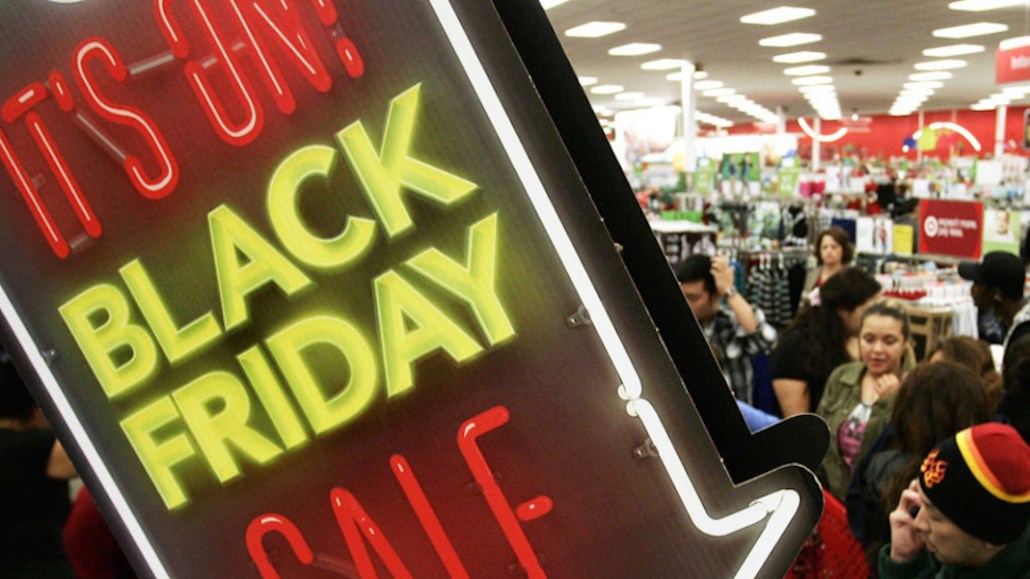Save 50% on a 3-month Digiday+ membership. Ends Dec 5.
Amazon and ‘self-gifting’ expected to lead Black Friday and Cyber Monday sales

Sales are already underway for several brands looking to get a leg up on Black Friday and Cyber Monday, as retailers continue the trend of elongated discounting.
“Our merchants start to experience an increase in [sales from discounts] throughout the entire week leading up to Black Friday and Cyber Monday, and we see sales start to level off a couple of days after Cyber Monday,” said Satish Janwar, vp of product at Shopify. “It’s a positive trend for both businesses and consumers, as it offers more flexibility, choice and opportunities to buy.”
However, whether or not these early sales — some starting as soon as October — prove to be advantageous remains inconclusive, as reports show that last-minute shopping continues to rise. At the same time, a rising number shoppers are using Black Friday and Cyber Monday as an opportunity for “self-gifting,” or finding deals on products for themselves, and waiting until December to purchase gifts for friends and family.
Compared to last year, Thanksgiving falls earlier in the month this year, which serves as an advantage to brands looking to profit using post-holiday sales, according to Forrester senior analyst Sucharita Mulpuru. As a result, retailers have more time to lure consumers, contributing to a forecasted uptick in average individual holiday spend to nearly $700, which is 8 percent more than last year.
“An earlier Thanksgiving just means more days for retailers to offer sales when shoppers are paying attention. It gives more key days to buy and it makes it easier for shippers like UPS and FedEx to deliver packages on time,” she said.
Here is a closer look at anticipated trends for Black Friday and Cyber Monday.
Ad position: web_incontent_pos1
Online sales will bounce back post-election
Analysts predict holiday sales will outpace last year’s, with projected gains in e-commerce. According to a report by Forrester, sales are expected to reach $129 billion this year, an increase of 12 percent from 2016. The climb can be attributed, in part, to stronger economic conditions and more positive consumer sentiment than last year. In 2016, analysts noted that online sales in particular took a hit in the wake of the presidential election, as many consumers were distracted by national news and politics.
Continued enhancements in user experience on both desktop and mobile platforms have also encouraged shoppers to flock to e-commerce. Improvements in cybersecurity to better protect credit card information in the wake of breaches has further bolstered consumer interest in online shopping. As a result, Fung Global Retail Technology is predicting online channels will be more popular than brick-and-mortar retailers, with 82 percent of respondents to a survey noting they plan to purchase gifts online, compared to just 77 percent planning to hit up physical stores.
Amazon will reign supreme
Digital sales are also expected to be driven largely by Amazon. The Fung Global Retail Tech report found that 75 percent of consumers who will holiday shop this year intend to purchase from the e-commerce platform. This figure climbs significantly for Amazon Prime members: Ninety percent indicated they will be making holiday purchases on the site.
In the mean time, Amazon is forging new partnerships to fuel the momentum. It has teamed with Calvin Klein on an exclusive line of underwear and is promoting its own private label brands, which continue to gain traction.
Self-gifting is on the rise
America’s Black Friday and Cyber Monday are becoming the next best thing to China’s lucrative “Singles Day,” a nationwide event of sales geared toward individual shoppers looking for gifts for themselves.
Ad position: web_incontent_pos2
“One of the things we’re seeing from our consumers is that self-gifting is becoming more predominant in the lead up to the holiday,” said Spring president Marshall Porter. “Sixty-four percent of people said they’ll be buying something for themselves.”
This figure is up from 2015, when analysts first noted an influx of consumers using Black Friday and Cyber Monday to shop for themselves, while waiting for mid-to-late December bargains to score gifts. At the time, the National Retail Federation cited that 60 percent of shoppers were buying items for themselves and that marketers were starting to take note by encouraging the behavior.
“Self-gifting is huge in November, because people wait for Black Friday or Cyber Monday to buy those special things [for themselves],” Mulpuru said. “Cyber Monday especially often has huge discounts site-wide, which shoppers love.”
More in Marketing

Ulta, Best Buy and Adidas dominate AI holiday shopping mentions
The brands that are seeing the biggest boost from this shift in consumer behavior are some of the biggest retailers.

U.K. retailer Boots leads brand efforts to invest in ad creative’s data layer
For media dollars to make an impact, brands need ad creative that actually hits. More CMOs are investing in pre- and post-flight measurement.
Ad position: web_bfu





